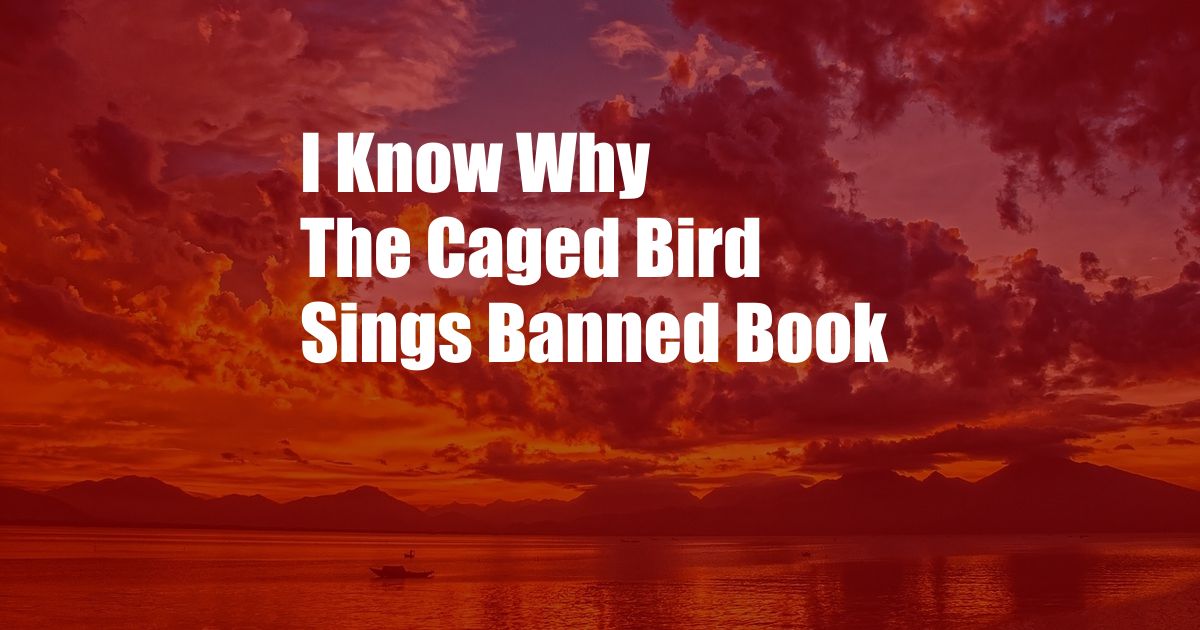
Why Was “I Know Why the Caged Bird Sings” Banned?
In Maya Angelou’s poignant memoir, “I Know Why the Caged Bird Sings,” readers are immersed in the harsh realities of a young girl’s life in the Jim Crow South. Yet, despite its literary acclaim and enduring legacy, the book has faced numerous challenges, including an infamous ban.
Censorship in the 1960s
During the turbulent 1960s, as the United States grappled with the Civil Rights movement, attempts to ban books that addressed controversial topics escalated. “I Know Why the Caged Bird Sings” was among the many works challenged due to its candid exploration of race, sexual abuse, and poverty.
The primary reason for the book’s ban stemmed from its portrayal of sexual violence and profanity. Critics argued that such content was inappropriate for young readers and violated community standards. Furthermore, the book’s unflinching depiction of racism and poverty was perceived by some as inflammatory and inciting.
Challenges and Resistance
Despite the concerted efforts of censors, the ban on “I Know Why the Caged Bird Sings” was short-lived. The book’s literary merit and its importance as a chronicle of the Civil Rights era resonated with teachers, librarians, and readers alike.
Educators and librarians stood in solidarity, recognizing the book’s educational and literary value. They spearheaded efforts to restore the book to school libraries, arguing that its honest portrayal of a marginalized experience provided insight and empathy for all readers.
Impact and Legacy
The controversy surrounding “I Know Why the Caged Bird Sings” ultimately elevated its status as a seminal work of American literature. The book’s enduring popularity and its inclusion in school curricula attest to its enduring relevance.
Critics who once objected to the book’s content have come to appreciate its unflinching honesty and its incisive exploration of American history. The book has become an essential tool for understanding the complexities of race, gender, and poverty in the United States.
Tips for Navigating Book Censorship
As book bans continue to be a contentious issue, it’s more important than ever to equip ourselves with strategies to combat censorship. Here are some tips for navigating book bans:
- Educate yourself: Stay informed about book bans and the reasons behind them. Knowledge is power in the fight against censorship.
- Support challenged books: Purchase challenged books, attend readings, and engage in discussions about their content. By showing support for challenged books, we send a clear message that censorship will not be tolerated.
- Advocate for educational freedom: Contact your elected officials and advocate for policies that protect students’ access to a wide range of books and resources.
Frequently Asked Questions
Q: Why was “I Know Why the Caged Bird Sings” banned?
A: The book was banned due to its portrayal of sexual violence, profanity, and its unflinching depiction of racism and poverty.
Q: How was the ban overturned?
A: Educators, librarians, and readers rallied together to restore the book to school libraries, arguing for its literary merit and educational value.
Q: What is the significance of the book today?
A: “I Know Why the Caged Bird Sings” remains an important work of American literature that provides valuable insights into race, gender, and poverty. It has become a staple in school curricula and has helped shape the national conversation on civil rights.
Conclusion
The banning of “I Know Why the Caged Bird Sings” serves as a reminder of the ongoing battle for freedom of expression. However, the book’s resilience and enduring legacy demonstrate that censorship cannot silence important voices. By standing up against book bans and supporting challenged books, we empower ourselves and future generations to engage with the full spectrum of human experience and understanding.
Are you interested in learning more about the challenges of book censorship and the importance of intellectual freedom?